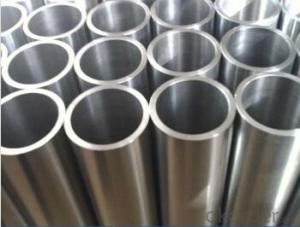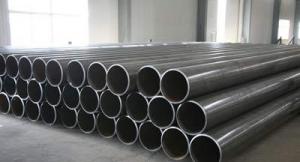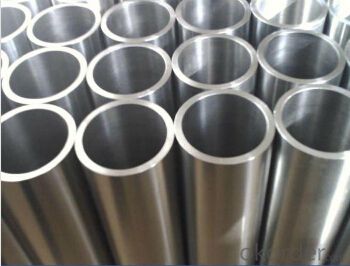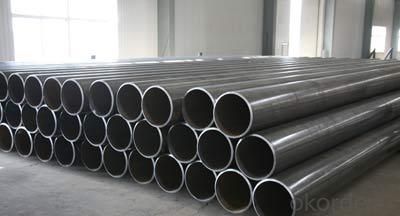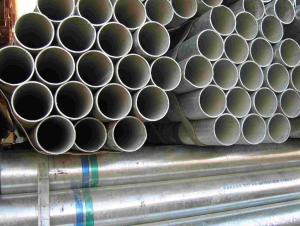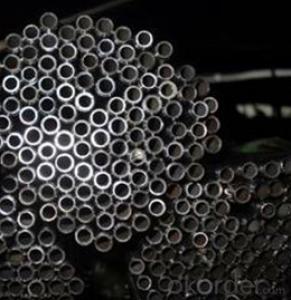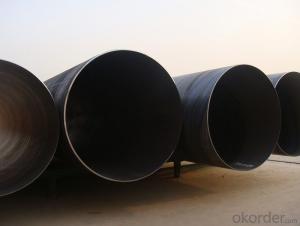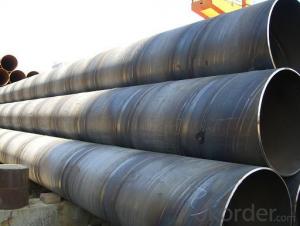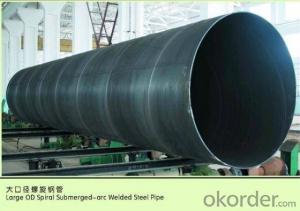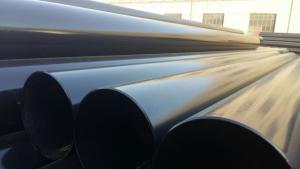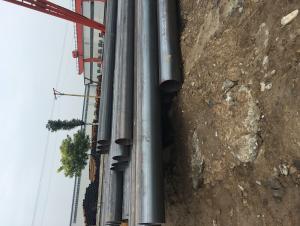Carbon Structural Steel Pipe 1086 Material
- Loading Port:
- China Main Port
- Payment Terms:
- TT or LC
- Min Order Qty:
- -
- Supply Capability:
- -
OKorder Service Pledge
OKorder Financial Service
You Might Also Like
ASTM 1086/JIS SWRS87A
No. 75 steel with similar properties of 65 steel, the elastic slightly worse than the 65 steel, high strength,
hardenability is low, generally used in the quenched and tempered condition. Used in the manufacture of
strength is not high, the helical spring, plate spring, the smaller size by the wear of mechanical parts.
Product Basic Information:
Material | 1086 | ||
Chemical Composition | Mechanical Properties(In Quenched & Tempered State) | ||
C | 0.72-0.80 | Tensile strength(MPA) | ≥1080 |
Si | 0.17-0.37 | Yield strength (MPA) | ≥880 |
Mn | 0.50-0.80 | Elongation(δ5/%) | ≥7 |
Cu | ≤0.25 | Reduction in Area (ψ/%) | ≥30 |
Ti | - | Impact (J) | - |
P | ≤0.035 | Hardness | ≤285HBS |
S | ≤0.035 | ||
Cr | ≤0.25 | ||
Ni | ≤0.30 | ||
V | - | ||
Product Sales Information:
Material | 1086 Carbon Structural Steel |
Size | Diameter:100-800mm Length: 4~6m Thickness:10-100mm |
Origin place | Made In China |
Delivery Condition | Hot rolled,cold drawn,forged |
Surface require | Black,grinding,bright,polish |
Heat treatment | Quenched,Tempered,annealed |
Packing | seaworthy packing ,wooden case ,carton,woven bag or at client's requires |
Delivery time | In 10-50 days |
Trade Term | EXW,FOB,CIF |
Payments | T/T or L/C at sight |
Port | China main Port,such as shanghai,Dalian,Shenzhen port. |
MOQ | 1 Ton |
Packaging & Delivery
Packaging Details: | seaworthy package,bundles wrapped with strong steel strip |
Delivery Detail: | 15-30days after received 30%TT |
FAQ of Carbon Structural Steel Pipe:
①How is the quality of your products?
Our products are manufactured strictly according to national and internaional standard, and we take a test on every pipe before delivered out. If you want see our quality certifications and all kinds of testing report, please just ask us for it.
Guaranteed: If products’ quality don’t accord to discription as we give or the promise before you place order, we promise 100% refund.
②How about price?
Yes, we are factory and be able to give you lowest price below market one, and we have a policy that “ for saving time and absolutely honest business attitude, we quote as lowest as possible for any customer, and discount can be given according to quantity”,if you like bargain and factory price is not low enough as you think, just don’t waste your time.Please trust the quotation we would give you, it is professional one.
③Why should you chose us?
Chose happens because of quality, then price, We can give you both.Additionally, we can also offer professional products inquiry, products knowledge train(for agents), smooth goods delivery, exellent customer solution proposals.Our service formula: good quality+good price+good service=customer’s trust
SGS test is available, customer inspection before shipping is welcome, third party inspection is no problem.
Any question, pls feel free to contact us !
Carbon Structural Steel Pipe Images
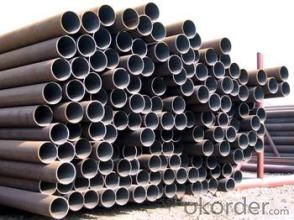
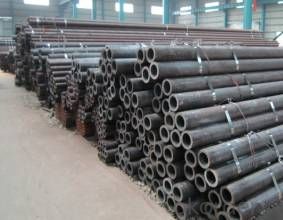
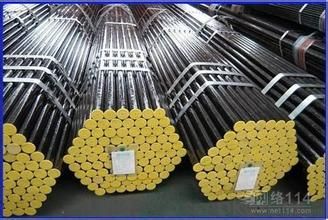
- Q: How are steel pipes used in the telecommunications network infrastructure?
- Steel pipes have a wide range of applications within the telecommunications network infrastructure. Underground cable conduits are one of the main uses of steel pipes in this industry. These conduits are responsible for safeguarding telecommunications cables from various external factors, including moisture, rodents, and physical damage. By providing exceptional strength and durability, steel pipes ensure the long-term protection of these cables. Furthermore, steel pipes are indispensable in the construction of telecom towers and antenna masts. These structures must possess robustness and resilience to withstand adverse weather conditions. Steel pipes offer the necessary strength, stability, and durability required for telecom towers to support antennas and other equipment. Additionally, their ease of assembly enables efficient deployment and maintenance of the network infrastructure. Additionally, steel pipes are crucial in the installation of fiber optic cables. Fiber optic cables transmit data at high speeds through the use of light signals. To ensure optimal performance, it is imperative to protect these cables from any external interference. Steel pipes serve as conduits for fiber optic cables, effectively shielding them from electromagnetic interference and other potential disruptions. To summarize, steel pipes play a vital role in the telecommunications network infrastructure. They are utilized for the installation of underground cable conduits, construction of telecom towers, and protection of fiber optic cables. The strength, durability, and versatility of steel pipes make them an ideal choice for guaranteeing the reliability and functionality of telecommunications systems.
- Q: What are the different types of steel pipe coatings for nuclear power plants?
- There are several types of steel pipe coatings used in nuclear power plants, including epoxy coatings, fusion-bonded epoxy (FBE) coatings, and polyethylene (PE) coatings. These coatings provide corrosion and chemical resistance to the steel pipes, ensuring their longevity and safety in the demanding environment of a nuclear power plant.
- Q: How are steel pipes tested for strength and durability?
- Steel pipes are tested for strength and durability through various methods, including destructive and non-destructive testing. Destructive testing involves subjecting the pipes to intense pressure or impact to determine their breaking point, while non-destructive testing methods, such as ultrasonic or magnetic particle testing, are used to detect any internal or surface defects that may compromise their strength and durability. These tests ensure that steel pipes meet the required standards and can withstand the intended usage conditions.
- Q: How do steel pipes compare to other materials like PVC or copper?
- Steel pipes have several advantages over other materials like PVC or copper. Firstly, steel pipes are incredibly strong and durable. They can withstand high pressure and extreme temperatures without cracking or bending. This makes them ideal for heavy-duty applications such as industrial piping systems or underground installations. Secondly, steel pipes have excellent corrosion resistance. Unlike copper pipes that can corrode over time, steel pipes are typically coated with anti-corrosive materials such as zinc or epoxy. This protective layer prevents rust and ensures a longer lifespan for the pipes. Furthermore, steel pipes offer superior fire resistance compared to PVC or copper. They are non-combustible and can withstand high temperatures for extended periods without deforming or releasing toxic gases. This makes steel pipes a safer option for applications where fire hazards are a concern. In terms of cost, steel pipes may be more expensive than PVC initially, but they offer better long-term value due to their durability and longevity. Copper pipes, on the other hand, can be quite expensive and are susceptible to theft due to their scrap value. Lastly, steel pipes are highly versatile and can be used in various applications, including water supply, sewage systems, gas pipelines, and oil refineries. They can handle high volumes of fluid with ease and are resistant to external factors like UV rays or physical impacts. Overall, steel pipes are a reliable and efficient choice for many industries and applications, offering strength, durability, corrosion resistance, fire resistance, and versatility that sets them apart from materials like PVC or copper.
- Q: What is the composition of steel pipes?
- Steel pipes are primarily composed of iron and carbon, with small amounts of other elements such as manganese, silicon, and traces of sulfur and phosphorus.
- Q: What are the advantages of using steel pipes in the mining industry?
- There are several advantages of using steel pipes in the mining industry. Firstly, steel pipes are extremely durable and can withstand harsh environmental conditions and heavy loads, making them ideal for underground mining operations. Secondly, steel pipes have high tensile strength, which allows for the transportation of large volumes of materials, such as ore or waste, over long distances. Additionally, steel pipes are resistant to corrosion and erosion, ensuring a longer lifespan and reducing maintenance costs. Lastly, steel pipes are relatively easy to install and can be welded together, providing flexibility in designing and constructing mining infrastructure.
- Q: What are the environmental impacts of steel pipe production and disposal?
- The environmental impacts of steel pipe production and disposal are mainly related to the extraction and processing of raw materials, energy consumption, greenhouse gas emissions, and waste generation. The production of steel pipes requires the extraction of iron ore and other raw materials, which can lead to habitat destruction and biodiversity loss. The processing and manufacturing of steel pipes also involve significant energy consumption, contributing to carbon dioxide emissions and climate change. Additionally, the disposal of steel pipes, especially if not properly managed, can result in waste accumulation and potential soil and water pollution. Therefore, it is crucial to consider sustainable practices and recycling options to minimize the environmental impacts associated with steel pipe production and disposal.
- Q: What are the advantages of using steel pipes in the manufacturing of furniture?
- There are several advantages of using steel pipes in the manufacturing of furniture. Firstly, steel pipes provide durability and strength, ensuring that the furniture is sturdy and long-lasting. Secondly, steel pipes have a sleek and modern appearance, adding a contemporary touch to the furniture design. Additionally, steel pipes are resistant to corrosion, making them suitable for both indoor and outdoor furniture. Lastly, steel pipes are versatile and can be easily shaped and welded, allowing for customization and flexibility in furniture design.
- Q: What is the lifespan of a steel pipe?
- The lifespan of a steel pipe can vary depending on various factors such as its quality, maintenance, and usage conditions. However, with proper care and maintenance, a well-made steel pipe can last for several decades or even more.
- Q: Can steel pipes be used for heat transfer applications?
- Heat transfer applications can utilize steel pipes as they are a great option for transferring thermal energy from one location to another. Steel is known for its excellent heat conductivity, making it a popular choice in heating, ventilation, and air conditioning (HVAC) systems, industrial process heating, and steam distribution networks. The high thermal conductivity of steel ensures efficient heat transfer, effectively distributing heat throughout the system. Moreover, steel pipes possess remarkable strength and durability, enabling them to withstand high temperatures and pressures commonly encountered in heat transfer applications. In summary, steel pipes are a dependable and extensively employed solution for heat transfer purposes.
Send your message to us
Carbon Structural Steel Pipe 1086 Material
- Loading Port:
- China Main Port
- Payment Terms:
- TT or LC
- Min Order Qty:
- -
- Supply Capability:
- -
OKorder Service Pledge
OKorder Financial Service
Similar products
Hot products
Hot Searches
Related keywords
